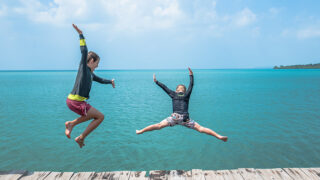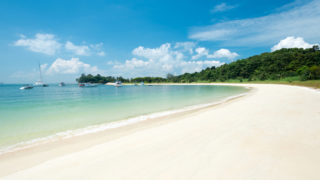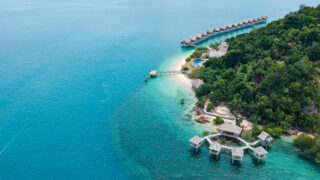Maldives resorts and guesthouses are probably the most perfect places to unwind – between the stunning water and the gorgeous beaches it’s not hard to see why this destination and a stay at one of the hotels in the Maldives are on most people’s bucket lists. This guide includes some reviews of where to stay in the Maldives, along with a fact file with all the travel info you might need, from visas and money, to the weather and some cultural background too!
Hotels in the Maldives
Amilla Fushi Maldives Resort
Traveller: Jacqui Young, British
We stayed at Amilla Fushi Resort on our Maldives trip and we loved it – it’s stunning. It’s just so beautiful and relaxing. We had to push ourselves to participate in the excursions beyond the island! The kids loved the snorkelling, where we saw some amazing marine life. They also enjoyed line fishing and the resort’s water sports, especially the jet-skis. The staff are amazing and they really helped to entertain the kids. Oh, and they were amazed with our wonderful accommodation – a treehouse!
The line fishing at night really stood out for us. We got to do it in traditional Maldivian style. It was really cool – something the Maldivians have practised for generations. It’s an activity we’d never really get the chance to do if not for this trip.
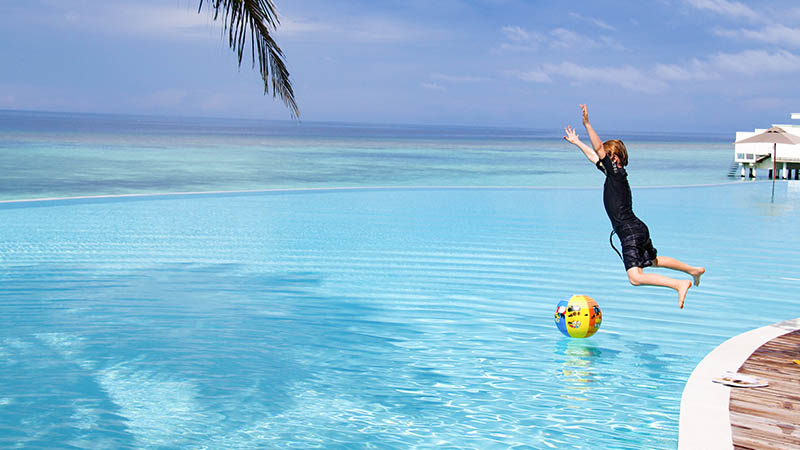
The Residence Maldives resort
Traveller: Annemarie Stupi, American
My partner and I travelled to The Residence Maldives at Dhigurah. It’s a beautiful resort with stunning views and fantastic service. Getting there was a bit tricky – first we flew to the capital Malé, then the next morning took a propeller plane to Kooddoo Airport. From there, it was a 10-minute boat ride to the resort. But the concierge made it very seamless. We were appointed a 24-hour butler who ensured our stay was sublime!
This Maldives resort is made up of two islands, ours being geared more towards couples. The other island is more of a family resort with activities and play areas. Visitors can either opt for personal transport by the staff or ride complimentary bicycles. We stayed in an overwater villa and the water was crystal clear; we were able to spot sharks, fish and manta rays from our room! The food was also very good, with several restaurants ranging from more relaxed to high end.
The views in the Maldives are just unmatched – everywhere you look is exactly like a postcard. A favourite part of the trip was riding around both islands on our bikes. On our last night, we went to The Falhumaa, an overwater restaurant where we enjoyed a meal by Chef Patrick Vitry.
The most hair-raising moment was the hour-long flight back to Malé from Kooddoo. Our little propeller plane flew into a thunderstorm and it was a bit scary! We were all praying to land safely (which we did). Overall, we had a wonderful experience at The Residence. This hotels in the Maldives is beautiful and the staff are very kind. Our only regret was that the trip wasn’t a few days longer!
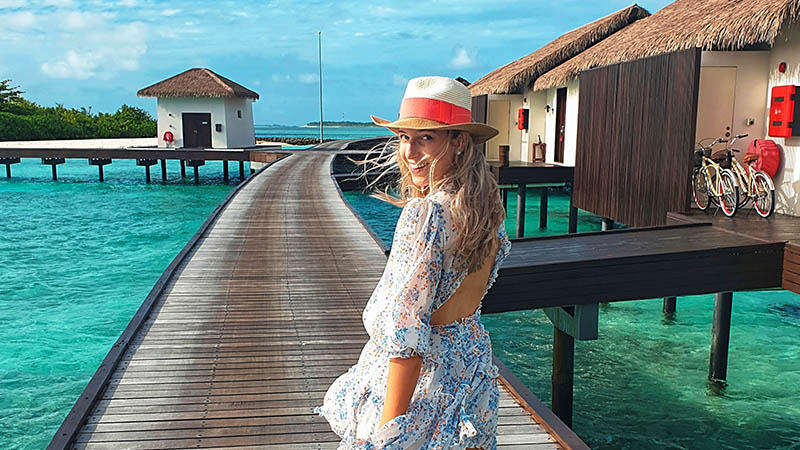
Kurumba Maldives resort
Traveller: Emma Morrell, British
We went to Kurumba for a week when our kids were one and three years old. It’s one of the closest resorts to Malé, a short speedboat transfer away. We deliberately chose it as we didn’t want to be hanging around waiting for a seaplane transfer or dealing with squirmy children in a tiny plane!
We aren’t really sit-on-the-beach-for-a-week people, so the resort was perfect – there are two swimming pools, tennis courts, a gym, a spa and a kids’ club. They had brilliant activities every day, from sandcastle building and pizza classes to arts and crafts. Of course, you can’t go to the Maldives without snorkelling or scuba diving – it’s an absolute must – and the water sports at Kurumba are also fabulous. There are also seven restaurants at the resort, which gave us the opportunity to eat in different places.
At this hotel in the Maldives we chose a garden villa room; it had a separate sitting area with a daybed and plunge pool, which the kids were delighted to jump into after a big day! The bed was so comfortable too – I don’t think I’ve ever slept so well on holiday! We loved the staff. Everyone was very friendly and helpful. The only drawback was the proximity to Malé; the views aren’t quite as picture-perfect in all directions as other islands further away.
Travelling with kids can be so stressful and tiring at times but this was the complete opposite! We were happy, the kids were happy, and life just felt really, really good.
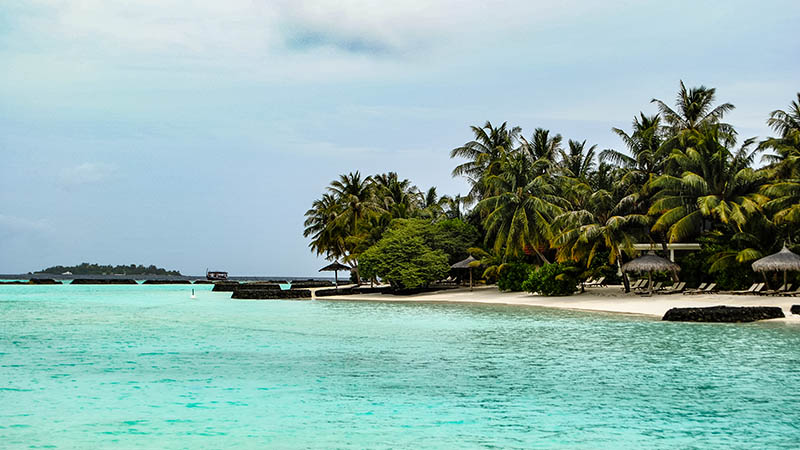
Conrad Maldives Resort Rangali Island & Four Seasons Kuda Huraa
Travellers: Michael and Britt Garrison, American
Our family visited the Maldives over the New Year period. We stayed overnight at Hotel Jen Malé in the capital as we wanted to take an early seaplane ride to Rangali Island.
We stayed in a two-bedroom water villa at the Conrad Maldives Rangali Island. This Maldives resort has fantastic snorkelling and the beaches are stunning – the kids spent many afternoons water-tubing and jet-blading. While there, my daughter and I got our Open Water Diver certification. There is also an underwater restaurant, which was expensive but the food was good and the atmosphere is worth a visit.
We then travelled to Four Seasons Kuda Huraa, at this hotel in the Maldives we had two one-bedroom beach villas. The service was second to none and we spent three days surfing there. The food was excellent – they accommodate even the pickiest of eaters (our son!).
We are very much an outdoorsy family that enjoys being out on the water. What stood out for us most for both stays is that we could be together for a week, with no one getting bored or asking what we’re going to do next. Our teenagers loved the diving and surfing; they can’t wait to go back.
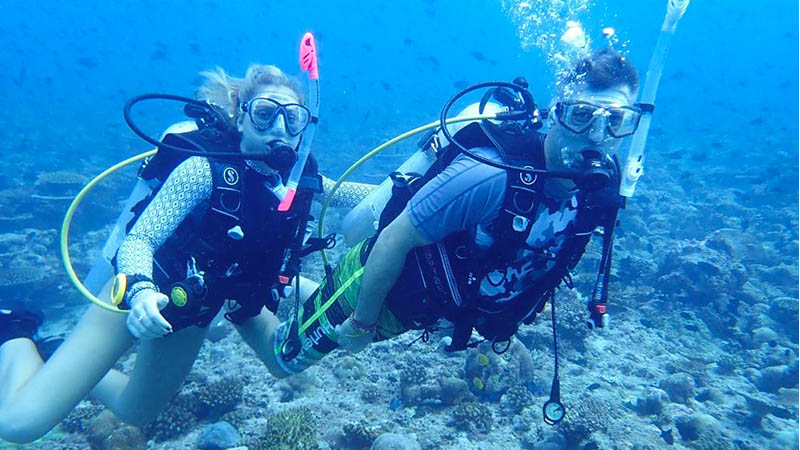
Dharavandhoo Guesthouse
Traveller: Karin van den Boom, Dutch
We’ve visited the Maldives a few times and our favourite local island is Dharavandhoo. The 20-minute flight from Malé over the atolls is just stunning – it’s exactly like the pictures on the internet!
In Dharavandhoo, we stayed at a locally owned guesthouse called the Biosphere Inn. Many locals have worked in the resorts so they offer great service for a low price. We loved observing daily Maldivian life while walking or cycling along the small roads made from sand. It feels like paradise!
There are only a few shops, restaurants and guest houses on the island. When staying in Dharavandhoo, you must visit Hanifaru Bay, where you can snorkel with manta rays and sea turtles and try to spot dolphins. Also, visiting the surrounding local islands and having lunch on a desert island are great day-trip activities.
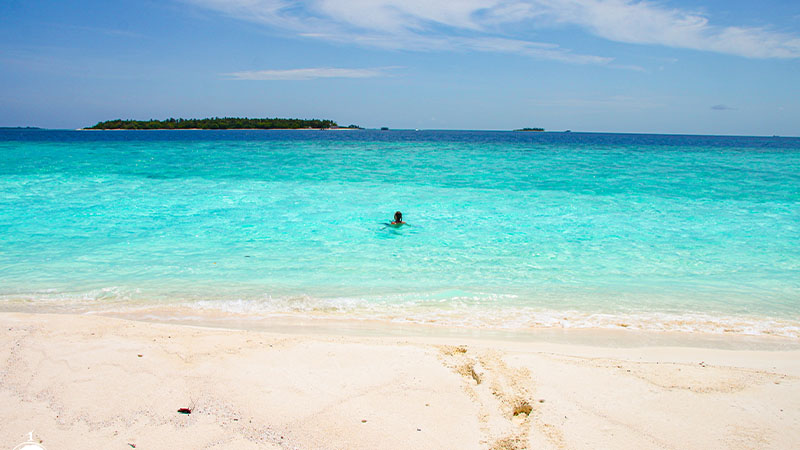
# MALDIVES TRAVEL TIPS
The Basics
Population: 391,000
Capital: Malé
Religion: Sunni Muslim
Emergency number: 102
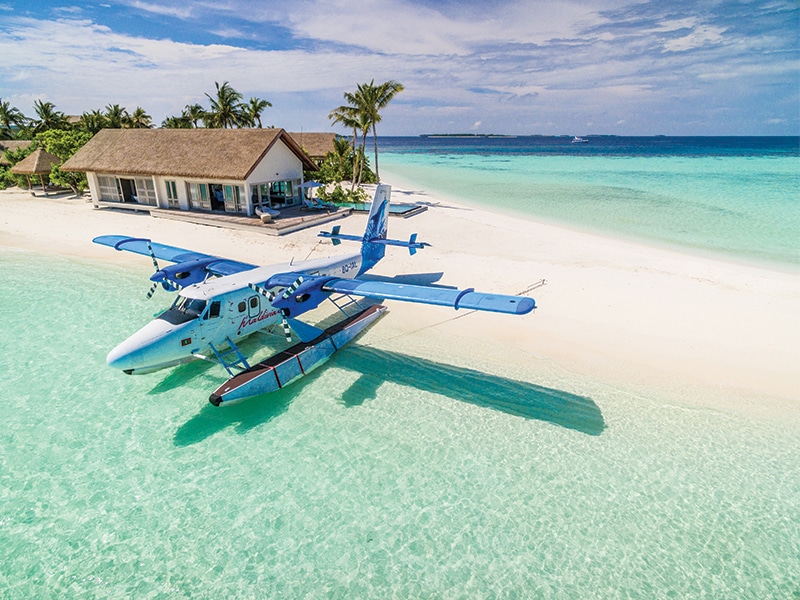
Some trivia on the Maldives
- The Maldives is the lowest country in the world, averaging 1.5 metres above sea level. The highest point stands at 2.3 metres.
- The Maldives is a Muslim country and as such you can’t bring alcohol into the country or consume alcohol outside resort hotels.
- It’s the smallest nation in Asia.
- In 2009, Maldives held an underwater cabinet meeting to raise awareness on climate change.
- The Maldives is creating the largest marine reserve in the world.
Key dates
- Ramadan (dates vary from year to year). All Maldivians mark the month of Ramadan, but service at the resorts should remain uninterrupted.
- 26 July: Independence Day. Commemorating the Maldives’ independence from the British protectorate in 1965.
- 11 November: Republic Day. This is a day that wishes peace and prosperity for its islands inhabitants. Expect parades with an Arabian influence.
Where to go in the Maldives
The Maldives is less about choosing a destination and more about choosing a luxury resort! Malé has a bit more going for it than many people think, and it at least gives a taste of Maldivian “street” culture, plus mosques, markets and more. There are no World Heritage Sites, though the Coral Stone Mosques located on various islands are on the “tentative” list for possible inclusion.
Some itinerary ideas: There are really only two decisions to make regarding a Maldives itinerary. Either you fly into Malé and then take a ferry to one of the resorts that are located closer to the capital, or you opt for a connecting sea-plane flight to a more far-flung atoll. If you choose the latter, it will often mean you’ll require an overnight stay in Malé itself.
Staying safe and healthy
Medical facilities are limited to two hospitals on the capital island, and neither has a trauma unit. Treatment can be expensive so make sure your travel insurance is comprehensive. You can check updated travel advice at tourism.gov.mv.
Cultural things
While you’re there, please don’t…
… go from beach to bar or restaurant in your bikini. Although the resorts are tolerant, you will be asked to cover up in areas other than the beach. And definitely don’t go topless – it’s illegal.
Before you go, read …
- Dhon Hiyala and Ali Fulhu by Abdullah Sadiq – a Maldivian Romeo and Juliet.
- The Strode Venturer by Hammond Innes – a 1965 thriller novel set partly in the Maldives.
- Maldives: Kingdom of a Thousand Isles by Andrew Forbes – history, culture, politics, economics: all are covered in considerable detail in this guide.
Before you go, watch …
The Island President – the story of the ousted President Nasheed and his fight for democracy and against climate change.
They said it
“On the milky white beaches, In the refreshing breezes at the seaside, To enjoy to your heart’s content, While admiring the beauty of nature, Diving spots, underwater gardens – the tourists crave, Water-sports and fishing trips, An unforgettable adventure, A country of seafarers, able bodied sailors, Start their life with the first rays of daylight.” – Ali Shareef from ‘Maldives – A Seafaring Country’
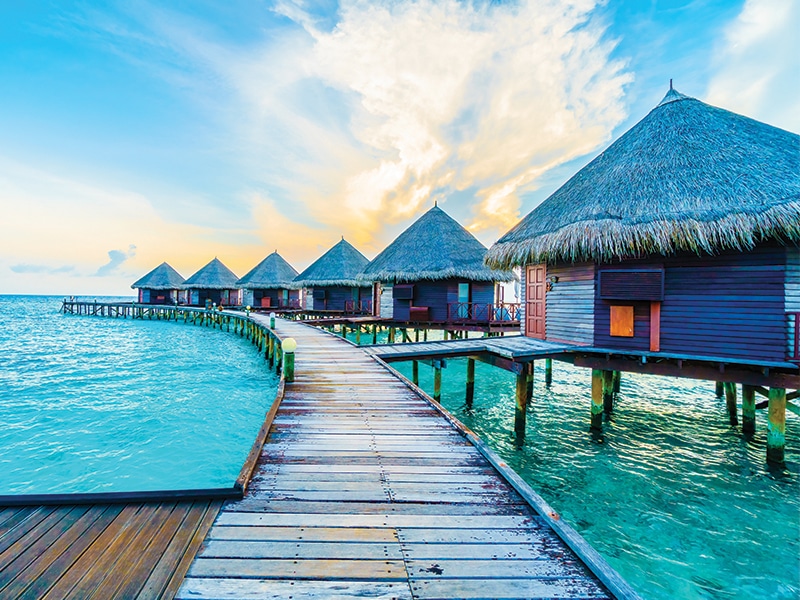
Important questions
Do I need a visa?
A 30-day free visa is issued on arrival for all nationalities, provided you possess a passport with at least six months’ validity, a return ticket, and enough funds to cover the expenses for the duration of your stay in the Maldives (US$100, plus $50 dollars per day or a confirmation of reservation in a tourist resort or a hotel).
What time is it in the Maldives?
The Maldives is 5 hours ahead of GMT (some islands are 6 hours ahead), 3 hours behind Singapore and 5 hours behind Sydney.
What’s the money situation?
The official currency of the Maldives is the Maldivian rufiyaa (MVR). Generally, you will not need rufiyaa as everything will be billed to your room at resorts and hotels and your bill can be settled with cash, credit cards or traveller’s cheques. Most local shops will accept US dollars; tipping is acceptable in this currency. Tipping is not compulsory as there is a service charge and a goods and service tax. ATMs do not exist outside Malé.
When’s the best time to visit?
Maldives has a tropical climate and can be visited at any time, although it does have two seasons: dry (December to April), April being the hottest month and December the coolest; and wet (May to November), when temperatures remain warm but rain and storms should be expected. May and October are the wettest months.
What’s the lingo?
Dhivehi and English. Here are some phrases of Dhivehi to get you started:
- Hello: Assalaa mu alaikum
- What is your name? Kon nameh kiyanee?
- My name is __: Aharenge namakee __
- How much? Agu kihaavareh?
- Thank you: Shukuriyaa
- Yes: Aan
- No: Noon
Last but not least
Is there anything I should know about meeting the locals?
Maldivians greet each other with a smile or the raising of eyebrows.
What’s a must-try dish?
Garudhiya, a light fish soup served with steamed rice, lemon and chillies, and mas huni, shredded smoked fish with grated coconuts and onions.
What should I buy as a souvenir?
There isn’t a huge range of souvenirs but underwater photos make for a good memory of the country’s amazing snorkelling and diving. Avoid coral products.
Like this on resorts and hotels in the Maldives? Read more in our Travel section.

